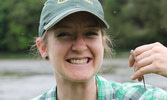HOME & GARDEN: White discusses the basics of backyard biology
BY SCOTT STEPHENSON
As Huron County’s go-to biologist, Rachel White spends a lot of her time looking at the big picture when it comes to the stewardship of our natural environment as a whole. It’s part of White’s job to consider the infinite, intricate and untold connections between each and every thing that lives, has lived, or will live in the county.
White’s work is part of a collaborative, multidisciplinary effort with other scientists who share the goal of increasing the resiliency of the natural environment in a way that will allow future generations to thrive. Simultaneously, White aims to inspire more local citizens to develop the sort of multigenerational, forward-thinking environmental mindset that is essential to ensuring a healthy future for Huron County farms, food and families, starting with the stewardship of their own backyards.
White understands that considering the grand interconnectedness of all living things can feel like a whole lot to deal with when you’re not a biologist, so she puts things simply. “For me, what stewardship actually looks like is connecting people with their environment. That means being in the environment, and witnessing the interesting things that are happening in the natural world around us... people feel good when they are outside in natural areas, and I think that’s indicative of something that’s inside all of us - the potential to connect with nature.”
Once one has forged that first connection with nature, it can open up a sort of ongoing conversational channel with the living planet. For some people, that conversation evolves into a lifelong passion. “There’s a lot that the environment can tell us,” White explained. “As a biologist, the quest is always ‘How do we collect information in a way that captures the diversity and complicated dynamics that are happening in the environment?’ I find that being outside and having that quest for knowledge is a really rewarding part of my job... if you saw my garden though, you might not believe I’m a biologist! I enjoy gardening, because I like to get my hands dirty and I really like learning about gardening, but I’m certainly a novice. I guess I’ll always be learning, because there’s a lot to know about gardening!”
For centuries, people have been gradually learning to forget to include themselves when thinking about the abstract concept of “nature”. Developments like the wheel and TikTok can often cause us to forget that human beings are as much a part of the natural environment as morels and mosquitos. Without the healthy discourse that fosters the cross pollination of thoughts, communal concepts like stewardship and resiliency would become purely academic concepts, instead of the lifeblood of a thriving community. “I think that we’re very lucky to have really interesting natural environments right in our backyards,” White pointed out. “We have habitats and species that are unique within the province, and, equally as important to me, we have a really welcoming community of people in Huron County. People are dialed-in, want to know their neighbour and also want to be active people, in terms of being outside and connecting with other people.”
White also has a bit of science-backed, common sense advice to make your yard into a more effective, active greenspace. “We should support native plants in our gardens as best we can. There are many benefits to doing that. Native plants, and native species in general, are adapted to local climates, so they need less watering and fertilizing than non-native species.” More native plants means more food and habitats for the native animals that depend on them.
Individual stewardship, in White’s eyes, is about striving to improve the natural environment while mitigating the outsized impact of our species on the planet with the goal of leaving a habitable future for incumbent generations. “You might think it's just a drop in the bucket to support native species, but I think a cumulative effort among many people who are creating diverse native gardens can result in a much greater impact.” White also advocated for recent initiatives like ‘No Mow May’ which has been educating and informing the public about the value of beneficial backyard insects since 2019 by suggesting a very small change in your lawn maintenance routine.
Backyard resiliency isn’t just about planting the right plants, it's about not planting the wrong ones. White brought up a popular shade garden ground cover as an example. “Periwinkle is a non-native groundcover that is very easy to grow, but if it escapes into woodlands, it becomes very difficult to control. It takes over the understory. By choosing differently, we can prevent further introductions into our natural spaces. It’s just another one of the benefits of trying our best to support our native species. We can have a better balance between resource intensive lawns and more natural habitats... lawns are not very diverse in terms of what they can offer to native insects and birds - lawns should be area rugs, not wall-to-wall carpet.”


